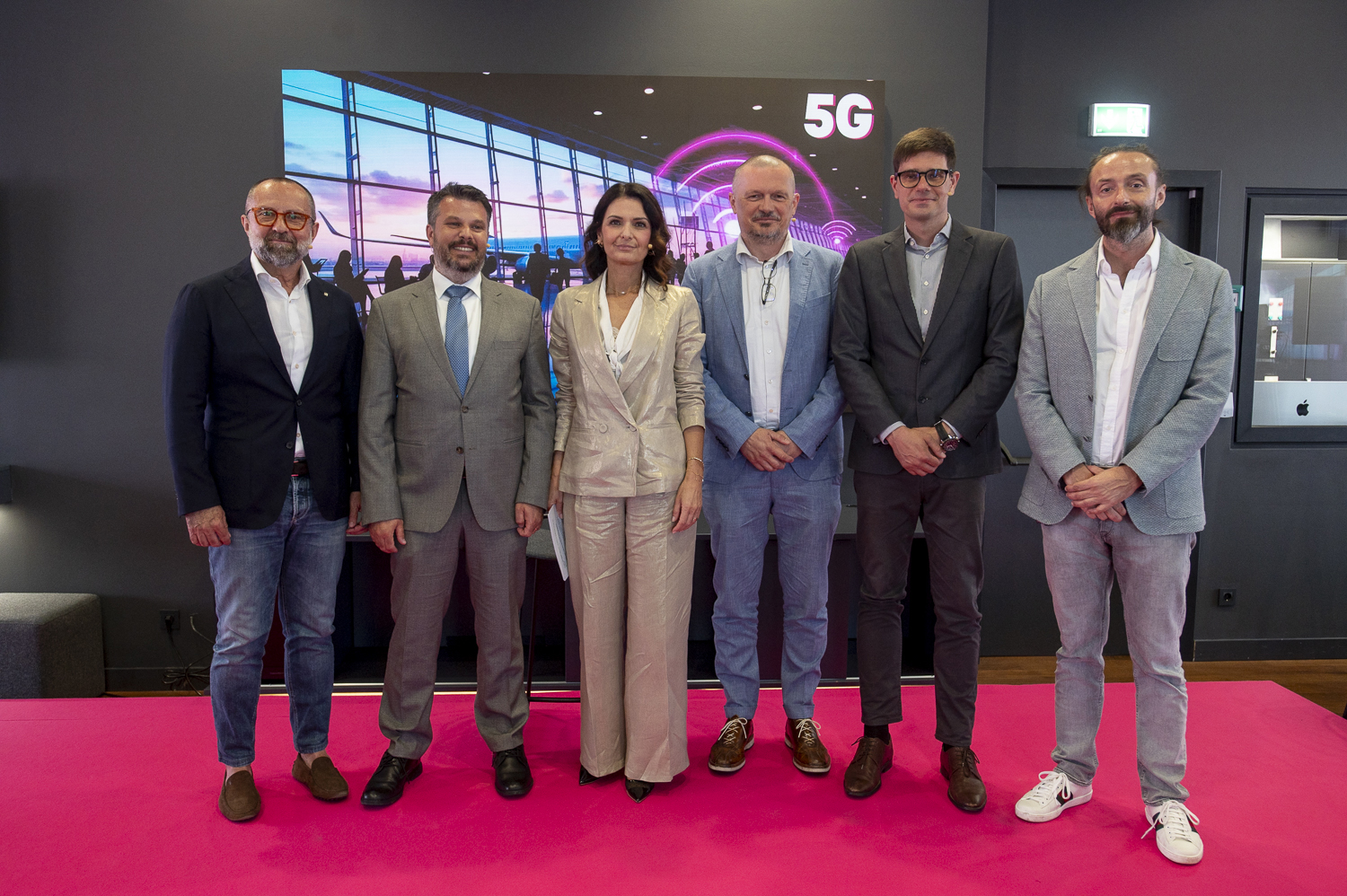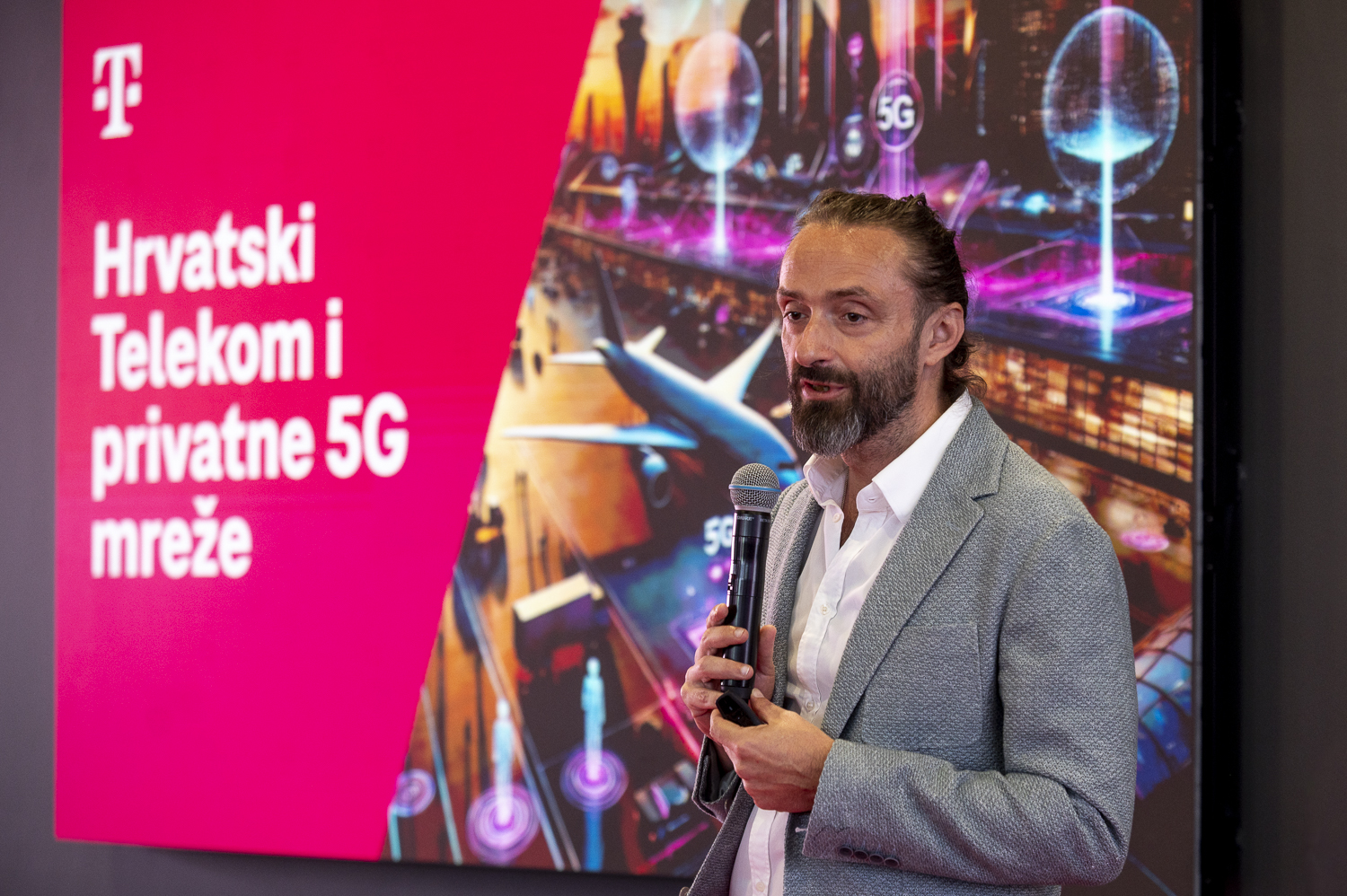18.6.2025
Hrvatski Telekom launches smart airport project with private 5G networks
- 'NextGen 5G Airports' project was developed in collaboration of Hrvatski Telekom, Markoja, the airports of Zagreb, Zadar, and Pula, and the Faculty of Transport and Traffic Sciences
- The project of private 5G networks at three Croatian airports has been submitted for co-financing under the European Union's Connecting Europe Facility (CEF) program, with the goal of establishing key prerequisites for realizing the "Smart Airports" concept in Croatia
- The total potential investment is valued at €5.6 million and encompasses all three airports.
- Panel discussion participants were: Marijana Bačić, Member of the Management Board of Hrvatski Telekom Business and Director of Combis; Matija Bračić, Assistant Professor at the Faculty of Transport and Traffic Sciences; Miran Gosta, Director of HAKOM; Boris Markoja, CEO and Board Member at Markoja; Marin Tica, Head of IT at Zagreb International Airport
- In the opening remarks, Boris Drilo, Management Board Member of Hrvatski Telekom for Technology and Information Technology, emphasized that private 5G networks are becoming a crucial tool for boosting efficiency, safety, and innovation in airport operations amidst the urgent need for digital transformation.
 Boris Markoja, Miran Gosta, Marijana Bačić, Marin Tica and Matija Bračić
Boris Markoja, Miran Gosta, Marijana Bačić, Marin Tica and Matija Bračić
In collaboration with the company Markoja, the Faculty of Transport and Traffic Sciences in Zagreb, and the airports of Zagreb, Zadar, and Pula, Hrvatski Telekom has presented the *NextGen 5G Airports* project, a private 5G network designed for airports, aimed at increasing operational efficiency, enhancing security, and improving overall user experience. The total potential investment is valued at €5.6 million and encompasses all three airports.
The key advantage of private 5G networks is complete control over the infrastructure, from planning and implementation to daily management and upgrades. It enables faster digitalization, a higher level of security, reliability, and adaptation to the specific needs of each airline, operator, or user. Given the large number of passengers using airport services (with more than 4.3 million at Zagreb Airport, half a million at Pula Airport, and a record 1.5 million at Zadar Airport last year), the implementation of private 5G networks across various segments can optimize airport operations.
With 14 kilometers of fencing, 188,684.95 m² of the runway, and a complex lighting and navigation system, the use of drones equipped with UHD cameras and AI-based analytics will significantly accelerate the inspection process, enable real-time detection of irregularities, increase the accuracy of data and assessments, and provide actionable recommendations at Zagreb International Airport.
Pula Airport, given its smaller capacity and area (8,200 operations in 2024, one runway 2,946 meters long, 10,488 meters of security fencing), will implement a system of 50 UHD cameras and RCR sensors along the fence, connected to AI software that detects damage, intrusions (by people or animals), and provides real-time recommendations.
Zadar Airport, with 7,879 operations in 2024, two runways (2,000 and 2,500 m), and 7.5 kilometers of security fencing, will implement industrial tablets with AI software for inspecting runways and fencing. This means that staff will no longer have to report irregularities verbally or via radio, as the data will be automatically sent for processing and decision-making.

The panel discussion "Implementation of Private 5G Networks in Croatian Airports", moderated by Marijana Bačić, Member of the Management Board of Hrvatski Telekom Business and Director of Combis, with participants Matija Bračić, Assistant Professor at the Faculty of Transport and Traffic Sciences in Zagreb, Miran Gosta, Director of HAKOM, Boris Markoja, CEO and Board Member of Markoja, and Marin Tica, Head of the IT Department at Zagreb International Airport, emphasized that private 5G networks enable integrated voice, data, and video communication between ground services, technical teams, and the operations center. Unlike older systems that support only voice communication and limited data, private 5G networks enable the integration of multiple communication platforms into a single unified system, reducing the need for multiple devices and simplifying network management.
"Our strategic direction is the development of flexible private 5G solutions that enable airports to digitalize key processes, from staff scheduling optimization to predictive infrastructure maintenance. Investments in private 5G networks allow Croatian airports to transform and be prepared for the challenges and opportunities of the future while providing a superior experience for all users and ensuring sustainable growth and competitiveness of the Croatian economy," said Marijana Bačić.
The panelists noted that implementing such innovations in a highly regulated environment, such as airports, requires detailed planning and close cooperation with the relevant institutions. Key factors for the air traffic modernization include private 5G networks, cloud technology, artificial intelligence, analytics, applications, and connectivity, which lies at the heart of this ecosystem, it was said during the discussion.
Private 5G networks work seamlessly with artificial intelligence (AI) and machine learning (ML), enabling real-time data transmission between aircraft and ground maintenance teams. With the additional use of augmented and virtual reality (AR/VR) and artificial intelligence, airlines can predict potential malfunctions and perform repairs faster and more efficiently. This reduces downtime and unexpected delays, resulting in significant financial savings and high user satisfaction with their services.
Thanks to the ability to transfer data in real-time between aircraft, air traffic control, and ground teams, private 5G networks enhance flight safety. By deploying 8K surveillance cameras and utilizing drones, continuous and unobtrusive monitoring of passenger activities becomes possible. Improved connectivity enables the delivery of up-to-date weather information to pilots, allowing for better decision-making and the avoidance of turbulent conditions.
Informing passengers and maintaining flight schedules is essential. Digitizing check-in and boarding can reduce the overall security screening time, while sensors and baggage-handling robots help minimize lost luggage. Autonomous ground support vehicles provide enhanced traffic control and streamlined baggage loading.
"We can allocate spectrum for private 5G networks in Croatia at a micro-location level under very favorable conditions. In addition, European financial instruments facilitate the funding of private 5G-related projects, while cooperation with operators opens the door to the knowledge and skills needed for the rapid deployment of sophisticated networks," emphasized Miran Gosta, Director of the Croatian Regulatory Authority for Network Industries (HAKOM).
"We see the implementation of a private 5G network as an opportunity for the airport, as well as other stakeholders operating within the airport premises, to enhance their processes and service quality in the areas of mobility, safety, and automation, particularly on the airside of their operations. We are pleased to take part in such projects, which present excellent opportunities for improvement, networking, and acceleration of development cycles," added Marin Tica, Head of the IT Department at Zagreb International Airport.
"Private 5G SA networks are changing the way we think about infrastructure; they are no longer just a backbone for connectivity but a foundation for the digitalization and automation of complex systems such as seaports and airports. At Markoja, we invest knowledge and resources in the development and implementation of 5G solutions that integrate advanced technologies, artificial intelligence, edge computing, and IoT, to create secure, scalable, and highly efficient operational environments. Our goal is clear: to enable infrastructure to become smart, adaptable, and future-ready," stated Boris Markoja, CEO and Board Member of Markoja.
"Secure and reliable communication infrastructure is the foundation of the next-generation airport, especially in the context of the growing application of autonomous systems such as drones, autonomous inspection vehicles, and various sensor technologies." In such an environment, private 5G networks demonstrate their full potential – thanks to ultra-low latency, high throughput, and network slicing capabilities, they enable the simultaneous operation of various applications and systems, with each assigned clearly defined priorities, reliability levels, and security policies – which is crucial in a complex and highly regulated environment like airports.
This allows security-sensitive operations to be conducted in a separate network segment, independently of other applications and communication flows at the airport. Such a technological framework not only enables faster integration of drones and autonomous vehicles into daily operations but also lays the foundation for new models of traffic management within the airport system, in line with European and international regulations on air traffic digitalization and safety," concluded Matija Bračić, Assistant Professor at the Faculty of Transport and Traffic Sciences in Zagreb.

In his opening remarks, Boris Drilo, a Member of the Management Board of Hrvatski Telekom for Technical and Information Technologies, emphasized: "As the number of travels increases, airports must transform, and this requires digitalization in various aspects to optimize operations and enhance the user experience. This is made possible thanks to connectivity powered by 5G. In the context of the necessary accelerated digital transformation of airports, private 5G networks are becoming a key tool for increasing efficiency, safety, and innovation in everyday operations – benefiting everyone: private travelers whose first action upon landing is to turn on their phone, airports and airlines that become more efficient, modern, and hubs of technological innovation, as well as local communities and the economy. If CEF co-financing is approved, the airports in Zagreb, Zadar, and Pula could use private 5G networks free of charge for three years, granting them access to the most advanced 5G SA technologies for the development of cutting-edge airport processes."
CEF (Connecting Europe Facility) is an EU co-financing program managed by the European Commission. Within the CEF Digital subprogram, the call "5G large scale pilots – 5G and Edge for Smart Communities – Works" was published in October 2024. The European Union co-finances up to 75 percent of eligible costs for large-scale pilot projects involving next-generation 5G networks that combine advanced connectivity with edge computing capacities in sectors such as healthcare, education, transport, and agriculture.